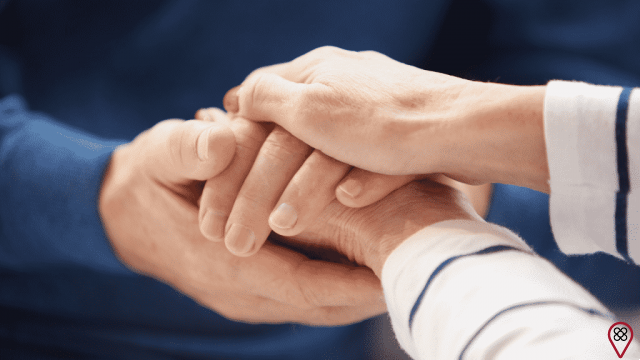You've probably been in a situation where there was a debate within the group, and tempers started to get a little heated, haven't you? There is always a person who seems aggressive to defend their point of view, a person who is offended, and there may even be those who cry. In this situation of debate, can you give an ultimatum and say who is right and who is wrong, or do you believe that everyone has a reason to take a position?
If you are the person who can decide the right thing and end the debate, you are a practical person. But the tendency is to take for granted the one who has a point of view in common with yours, which may not always be the truth.
On the other hand, people who understand the positions of others are more empathetic, because, despite not having lived the same experiences, they are able to understand the reason for that opinion.
Despite this, being a practical person is not bad, but there are times when you need to be more empathetic than practical. And empathy does not mean following the opinion of others and overruling your own, but understanding that there are other perspectives that can still be explored.
Understand more about what empathy is, how to work it, its importance and some books that can help you understand more about this concept. Follow the article to find out!
What is empathy?
Empathy consists of emotionally identifying with the other person. Thus, it means seeing their perspective and understanding their points of view, actions, beliefs and values, even if the other's life doesn't seem to have similarities with ours.

Empathy is less about our side of the story and more about seeing the other person's situation, and thus understanding their motivations. That is why this concept is always linked to the expression “putting oneself in the other's shoes” and is related to understanding, affection for the other and respect for their identity.
Examples of empathy
If so far everything has seemed a bit abstract, think about people who work in NGOs. They are not paid for their work, but are totally dedicated to the cause, whether in favor of abandoned animals, combating domestic and child violence or even welcoming refugees. All these people work because they understand the situation the other is going through – even though they have never been in such a position – and they want to help them overcome difficult situations without demanding anything in return.
Mothers are also very empathetic with their children. Imagine a case in which the son reports to his mother that she has been bullied at school. This mother will feel the pain that her son felt and, like him, will have feelings of sadness, indignation and even anger. But as an adult, she will be able to talk to the school and those in charge. That is, although she puts herself in her son's shoes, she does not behave like the son or cancel her own feelings, but acts in the best way, considering what the son feels.
Going back to the example from the introduction, in case of discussion in a group, an empathetic person would not end the conflict by electing a person for granted, but would give time for each one to express their opinions and take into account the particularity of each one to, based on this, come to a conclusion.
Above all, empathy is about understanding the other, seeing the other and giving them the chance to be heard and respected without judgment.
What does lack of empathy cause?
To be empathetic is to be human. But, despite the beautiful meaning of empathy, it is often lacking, because it is not always easy to hear what the other person has to say and, despite not agreeing, to understand it. However, it is an exercise that must be practiced, because the lack of empathy can make us selfish, insensitive and prejudiced.
The lack of empathy weakens all relationships - not just the loving ones, but with anyone else. In the end, no one wants to live with someone who is always right and never even considers listening to others.

In the long run, the lack of empathy causes people to become superficial and start to live in a bubble, isolated from all reality, thoughts and ideas that are different from their own. The famous “But everyone I know said/does that”. Of course, because people without empathy take anyone who is different from their circle of friends.
Also, living without empathy causes indifference - the typical "It's your problem". Obviously people must solve their own problems, and we must not take all the pains of everyone we know. But indifference is another level, where someone doesn't even want to know if the other is in trouble or not. So, it's not even a matter of not giving advice or help, because the person didn't even bother to listen or want to know about the other.
In this way, selfish people and without any empathy end up being alone, without friends to count on and without deep relationships with anyone.
Why create and work on empathy?
Being an empathetic person and open to conversation is an important social function, and while empathetic people do not act this way for their own benefit, they do benefit from their own actions.
By listening to each other, we get to know other points of view and other stories. This also makes us get to know each other better, because we can think: "What would I do in that person's place?", also better understanding our own feelings and contributing to our emotional intelligence.
In addition, empaths know how to lead conversations and deal better with difficult situations, which creates less stress for everyone involved.
Remember people without empathy? They don't have deep relationships, but empaths tend to have much better and longer-lasting interpersonal relationships. You know that sensible friend who always has the best advice? He's probably an empathetic person who listens to what you have to say and therefore knows what to say too.
7 books to create and work on empathy
It can seem difficult to start acting with more empathy, especially with the various tasks of everyday life, where we may feel that we don't have time to listen to what others have to say. However, it is important to create and work on empathy on a daily basis. So, we bring you some tips on how to have more empathy: books that help you create and work with this quality. Check out!
“Nonviolent Communication: Techniques for Enhancing Personal and Professional Relationships” – Marshall Rosenberg

In “Nonviolent Communication: Techniques for Enhancing Personal and Professional Relationships,” psychologist Marshall B. Rosenberg talks about the importance of nonviolent communication (NVC), what it is, how it works, and what problems it solves (spoiler: knowing if communicate well, you can solve everything – or almost).
Chapters 7 and 8 deal specifically with empathy and the importance of being present and, above all, listening to what others have to say.
Thus, each chapter brings, in a didactic way, ways to communicate with other people, solve problems and conflicts without judging or using violence.
“The Power of Empathy: The Art of Putting Yourself in Another’s Place to Transform the World” – Roman Krznaric
Reference book for anyone who wants to delve deeper into the study of empathy, in “The Power of Empathy”, Roman Krznaric recommends habits to become a more empathetic person, such as having other experiences (travel, doing volunteer work), talking to others, listen and be heard, and even use social media to shed light on an issue that needs to be discussed.
In this work, Krznaric shows the power that people have to change the world. But this starts when we stop living a solo experience and start to see the world as something collective, seeing, understanding and fighting for the problems of the other, so that not only those who are close, but also the most distant people, do not have to suffer.
“On Your Neck” – Chimamanda Ngozi Adichie

Increasingly recognized, Adichie is a Nigerian writer and has gained many fans. In 12 short stories, “No Seu Pescoço” portrays racial inequality, immigration, prejudice and stereotypes. Like all of Adichie's works, the 12 short stories are an invitation to empathy, to fight racism and xenophobia and to understand that a person must not give up their culture and identity in order to be respected.
“The Things We Say” – Ruth Rocha
In this children's book aimed at children from the age of 7, Ruth Rocha teaches something valuable for adults, parents and teachers, as well as children: words have power, and we must use them with care. With rhyming verses, “As Coisas Que a Gente Fala” teaches about lying and its consequences, the distortion of words and how they can hurt other people.
“The Kite Runner” – Khaled Hosseini

Anyone who has read any of Khaled Hosseini's works knows that reality is harsh. In “The Kite Runner,” inequality, injustice, and guilt are addressed so realistically that the reader has no choice but to empathize with the characters' plight. Amir, the main character and narrator of the story, lives in Kabul, Afghanistan, and is a rich man who regrets and tortures himself for years for not helping his friend Hassan when he was raped for being considered an “inferior race”. The narrative shows how Hassan was constantly in Amir’s memory and how he tries to redeem himself with his friend, making us understand that silence is a form of violence when it comes to inequality and that there is no “compensation” for it. One must act for the other in a timely manner.
“Essay on Blindness” – José Saramago
Launched in 1995 and awarded the Nobel Prize for Literature in 1995, “Essay on Blindness” is perhaps Saramago's most famous and impactful work. And, despite the time of publication, it fits the situation we live today.
The work narrates how “white blindness” infected thousands of people and that, long before these people lost their sight, they could no longer see. Not literally, but in the sense of paying attention to the other, in what matters. And the loss of vision only heightened the disharmony of society. Only when you look at the other and see him is there hope.
“I Thought This Only Happened to Me” – Brené Brown

Brené Brown commonly writes about courage and empathy, and “I Thought It Only Happened To Me” is no different. In this book, the author addresses how shame impacts our lives and makes us live with fear and limitations. In the face of shame, we have to be resilient, accept the empathy of others and be empathetic too. Although the book addresses the feeling of shame in women, reading is valid for everyone, and that's what empathy is all about.
Phrases to create and work empathy
“The paradox of listening is that when we give up power – the temporary power to speak, to affirm, to know – we become more powerful. When you stop talking or preaching and listen, here is what happens: … You begin to see other people as your peers – and maybe even allies. Stop seeing other people as stereotypes. It goes from 'us versus them' to simply 'us'. The goals become shared, not conflicting.” (Amy Cuddy in “The Power of Presence”, 2016)
“We have four options when we hear a difficult message: 1. blame ourselves; 2. blaming others; 3. realize our own feelings and needs; 4. noticing the feelings and needs of others.” (Marshall B. Rosenberg in “Nonviolent Communication, 2006)
"Almost there is no better way to challenge your prejudices and stereotypes about someone than to talk to them and hear what they have to say, and you may very well find that you were wrong, and it helps you not to transfer too much of yourself to others.” (Roman Krznaric, 2018)
“So when we speak, we have to be careful. That the things we talk about go flying, go flying and stay everywhere. And they even modify what was our message.” (Ruth Rocha in “As Coisas Que a Gente Fala”, 2012)
“If you can look, see. If you can see it, fix it.” (José Saramago, in the epigraph of “Essay on Blindness”, 1995)
“Stories matter. Many stories matter. Stories were used to plunder and slander, but can also be used to empower and humanize.” (Chimamanda Ngozi Adichie in “The Peril of a Unique Story”, 2019)
You may also like
- Ponder empathy with this heartwarming tale
- Understand what empathy is and why we have to practice it
- Reflect on the standards that society considers “normal”
You can see that empathy is necessary for world well-being and personal well-being, right? Listening to others is a missing quality, not only for pure selfishness, but for the need to obtain immediate results, for the idea that time is money, so “I don't have time to listen to stories”. The society we are in wants to put us in a position of not exercising empathy. But listening and being heard and being understood are human needs, and it is from listening and understanding the other that we understand ourselves and can create significant changes. Culture, maturation, non-conformism, resilience… all this – and much more – is the result of empathy.

























